|
1 High Street
Tonbridge
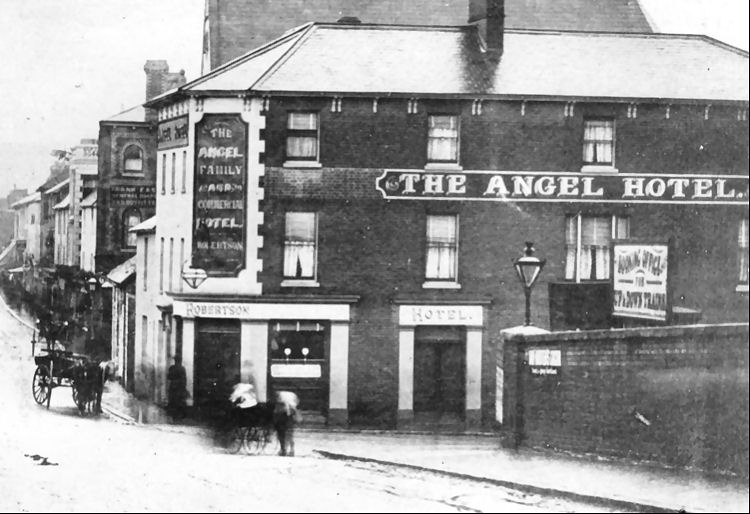
Above photo pre 1900. |
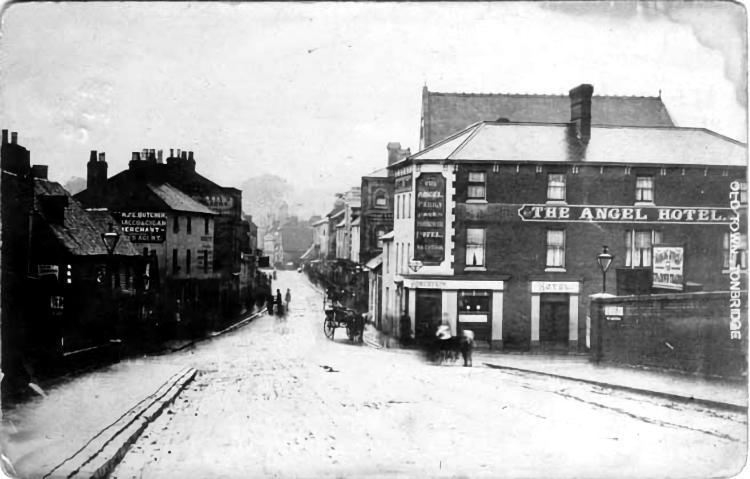
Above photo pre 1900. |

Above photo, pre 1900.
By kind permission
http://tonbridgecollectables.com/index.php |
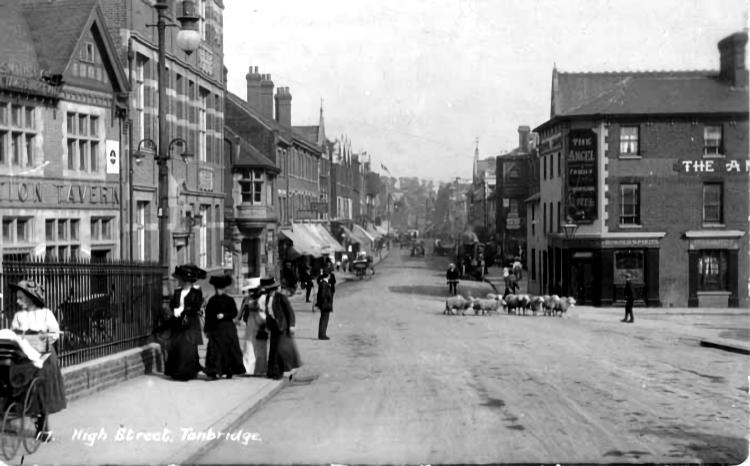
Above postcard circa 1900. |
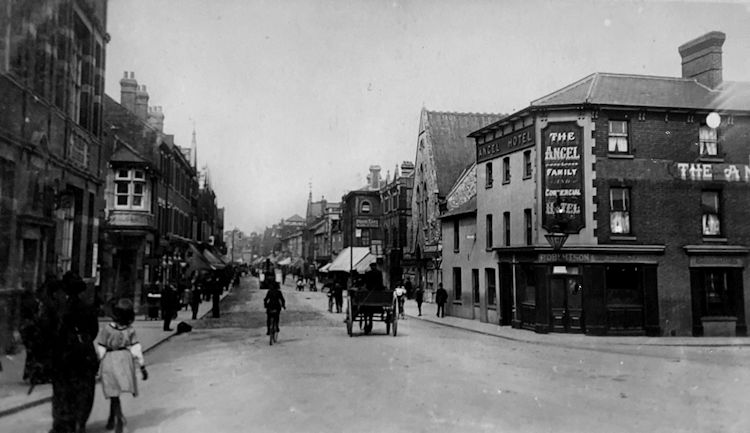
Above photo, circa 1903, kindly sent by Rory Kehoe. |
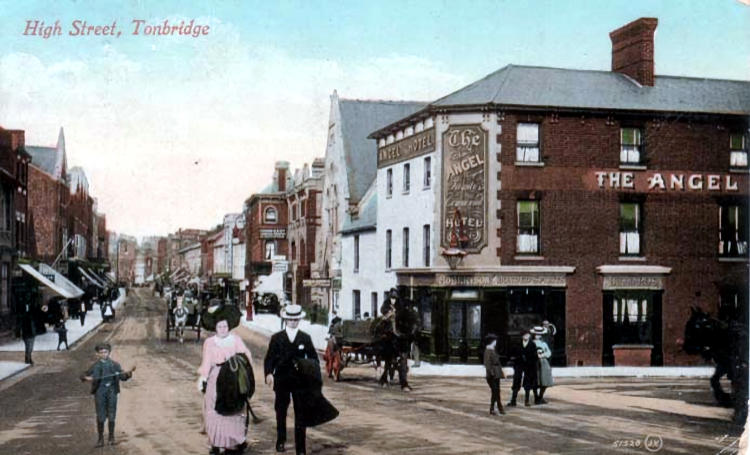
Above postcard, circa 1910. |
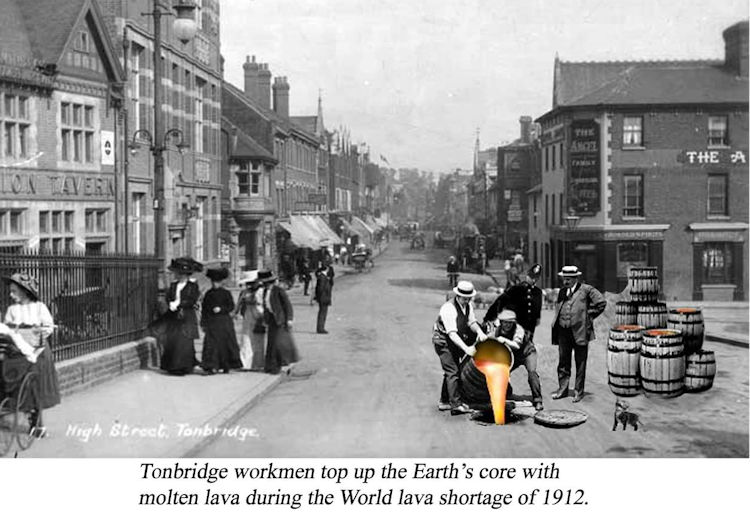
Above postcard, supposing 1912. Not quite sure what they are tipping down the
drains here, but I don't think it was lava. |
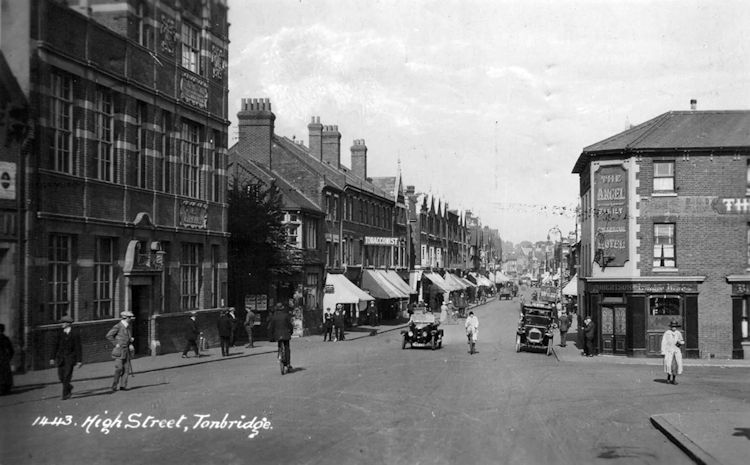
Above photo, circa 1924. Kindly sent by Rory Kehoe. |
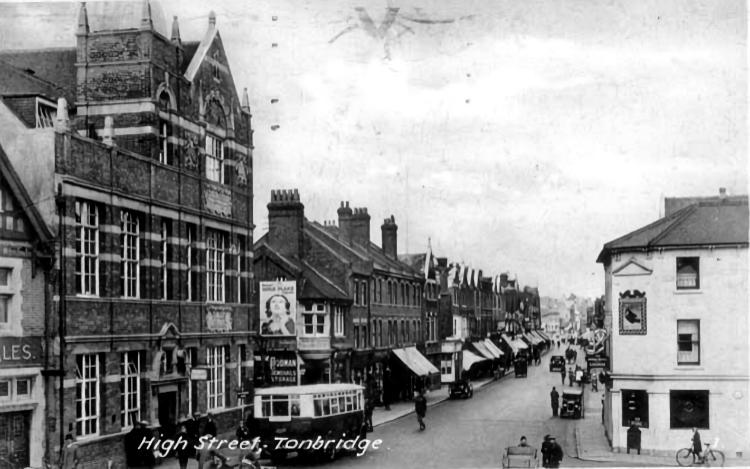
Above postcard, 1930s. |
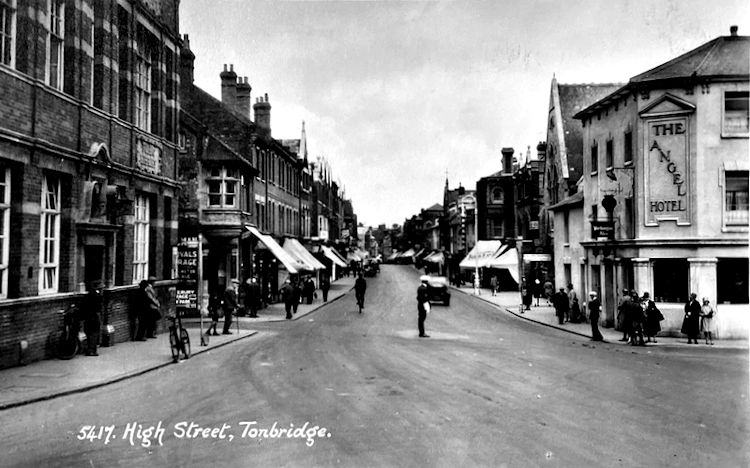
Above photo, circa 1935, kindly sent by Rory Kehoe. The signage suggests
that the "Angel" was a far-flung outpost of Worthington's Burton Brewery
(since 1927, a subsidiary of Bass) and in later years, following various
mergers, the "Angel" was to become a Bass Charrington tied house. |
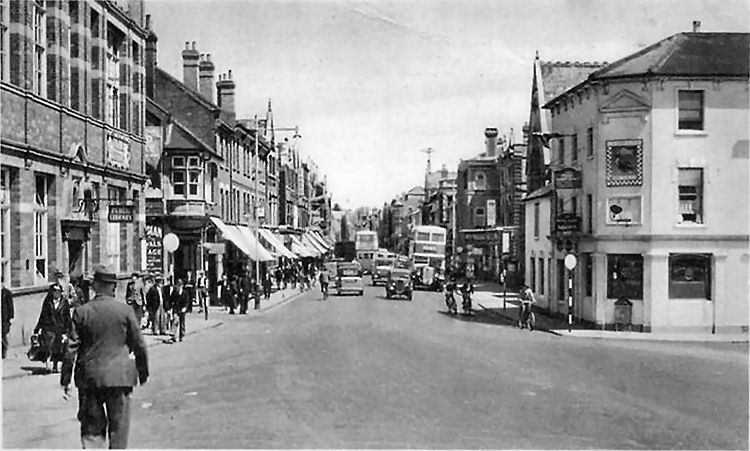
Above postcard, 1950.
By kind permission
http://tonbridgecollectables.com/index.php |
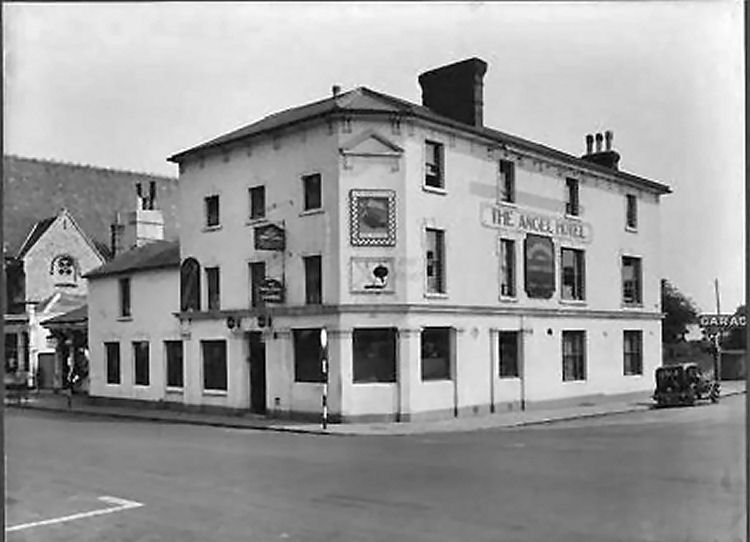
Above photo, date unknown.
By kind permission
http://tonbridgecollectables.com/index.php |

Above photo, date unknown, showing pub at the end of the road. |
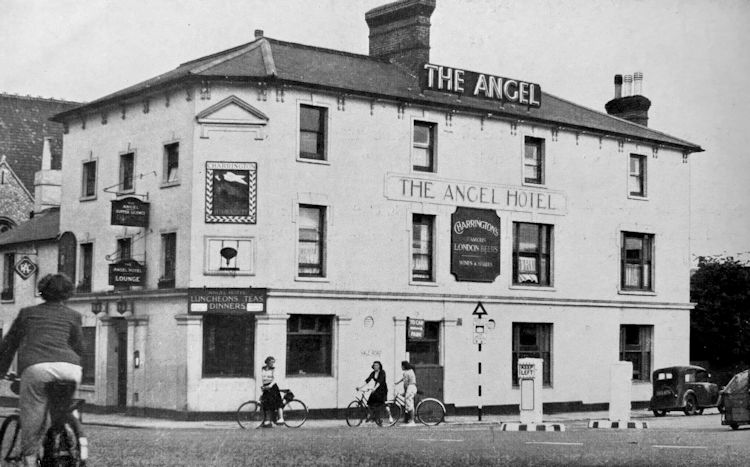
Above photo 1950. |
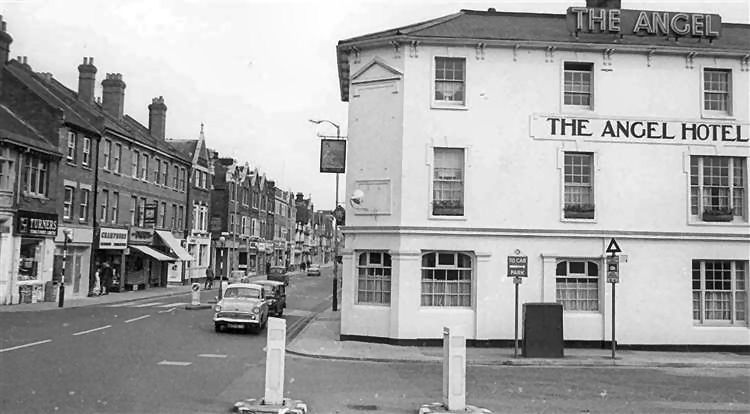
Above photo, date unknown. |
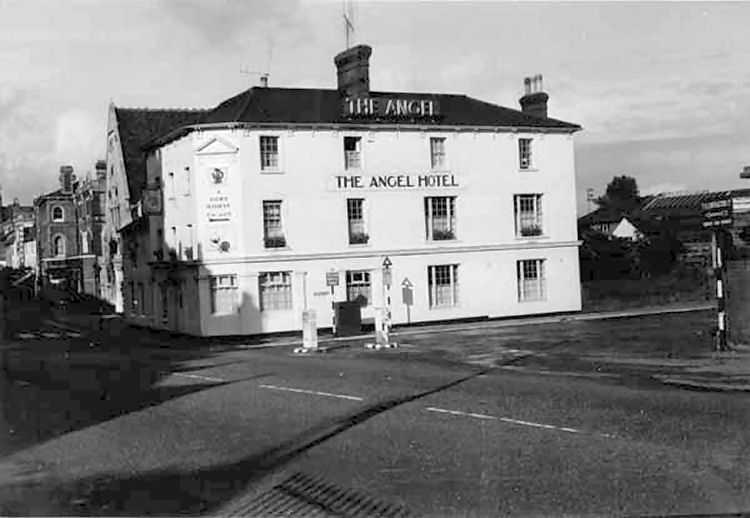
Above photo, 1963.
Kindly supplied by
http://www.tonbridgehistory.org.uk/ |

Above photo, date unknown. |
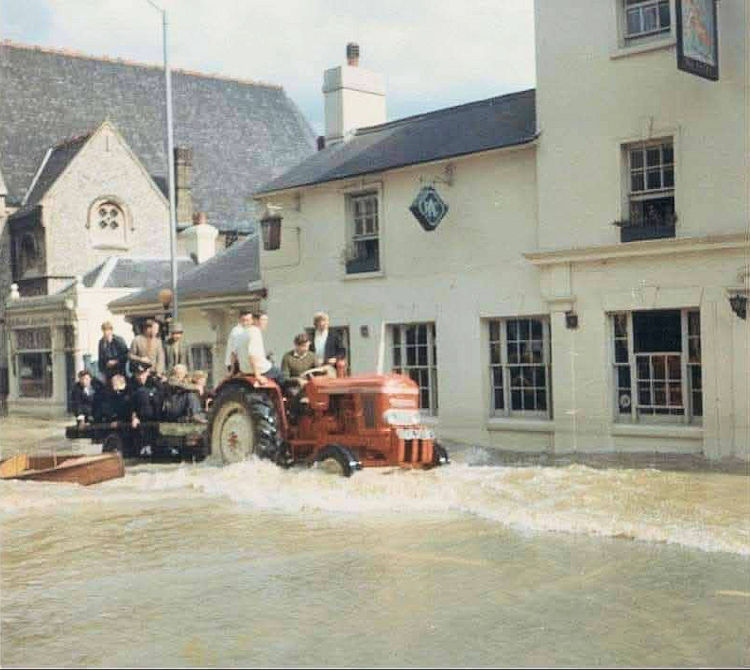
Above photo, floods of 1968. |
|
Taken from Kent a Chronicle of the Century book 3.
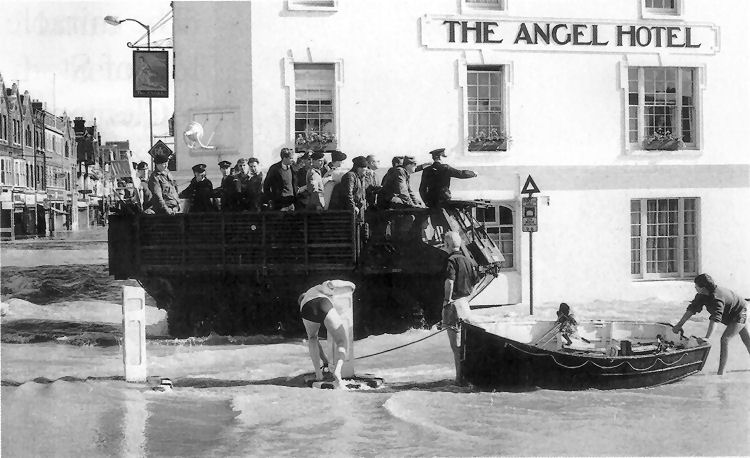
Tonbridge 1968, where amphibious vehicles took people to safety. The
cellars of the "Angel Hotel" are badly flooded.
‘Tropical’ storm brings chaos to Kent
September 16th 1968: Kent today is mopping up following one of the
greatest storms of the twentieth century. Right across the county towns,
villages and hamlets are under water. Rivers are running wild down the
valleys, roads and railway lines are blocked by landslides and lakes
spread out over hundreds of acres of Kent’s fertile land. In many places
vehicles have floated away and helicopters have been employed to rescue
people in distress.
The culprit was a rapidly-deepening area of low pressure to the
south-west which produced a ‘trough’ across the south-east. It remained
stationary all day on Saturday (14th) and that meant prolonged, heavy
rain.
For hour after hour from the early hours of Sunday morning to nightfall,
lightning flashed, thunder rolled and the great blackness above released
its load in proportions of tropical intensity.
In Tonbridge the River Medway overtopped the town bridge and flood
waters swept into the High Street inundating most of the shops. All the
factories and works were flooded, Cannon Bridge was washed away carrying
with it the town’s main sewer.
In Maidstone the Medway lapped the arches of the town bridge. As water
filled the pedestrian subway and swirled up the High Street the town was
closed and an emergency
declared. Boardwalks were erected yesterday by the Royal Engineers. They
may have to be extended.
It’s the same story over much of low-lying Kent. Along the courses of
the Medway, the Stour, the Ravensbourne, the Eden, the Darent, the Swale
and all their tributaries flood defences have capitulated and some
people are still trapped in upstairs rooms.
The village of Shoreham is cut off. The bridge at Otford has been swept
away. Westerham is under water and General Wolfe, sword aloft, looks
more like a ship’s captain alone on the bridge. Dartford is inundated
and, at Edenbridge, drama has followed drama.
Last night in Edenbridge the swirling muddy water was almost at rooftop
height and people marooned in their bedrooms. Some tried to swim for
safety but were seen being swept from one roof to another. Lifelines
were thrown to those in trouble; they were all saved.
From the air today large areas of Kent are waterlogged with factories,
churches, oasts and the tops of apple trees floating in the middle.
Reception centres have been set up and all voluntary organisations
mustered. Police, fire, ambulance services and soldiers are
overstretched and undermanned. Kent now faces the most urgent rebuilding
programme since the war.
|
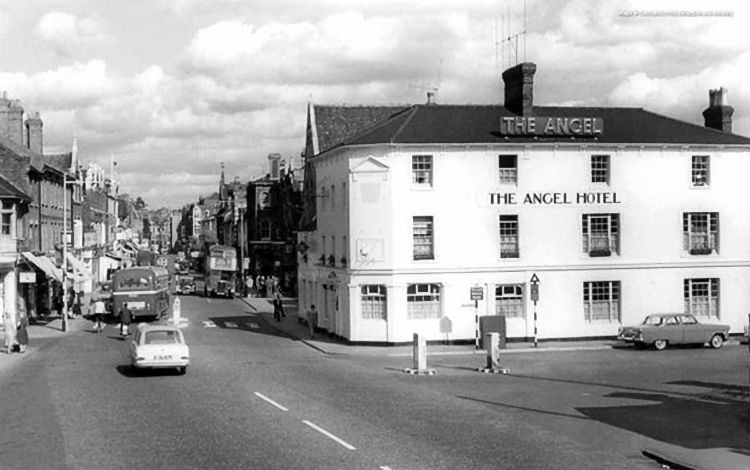
Above photo, circa 1972. |
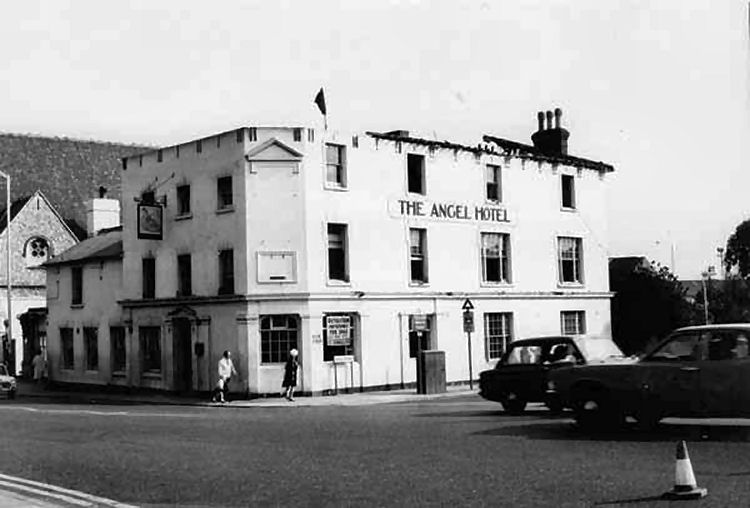
Above photo, 1 September, 1972.
Kindly supplied by
http://www.tonbridgehistory.org.uk/ |
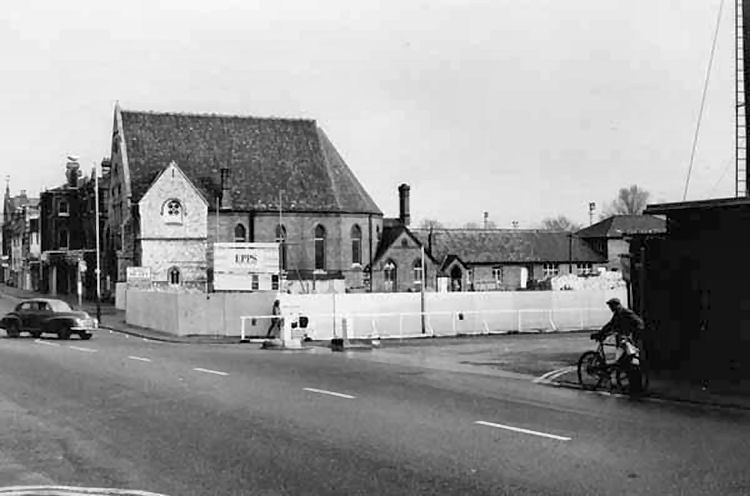
Above photo, 26 November, 1972.
Kindly supplied by
http://www.tonbridgehistory.org.uk/ |
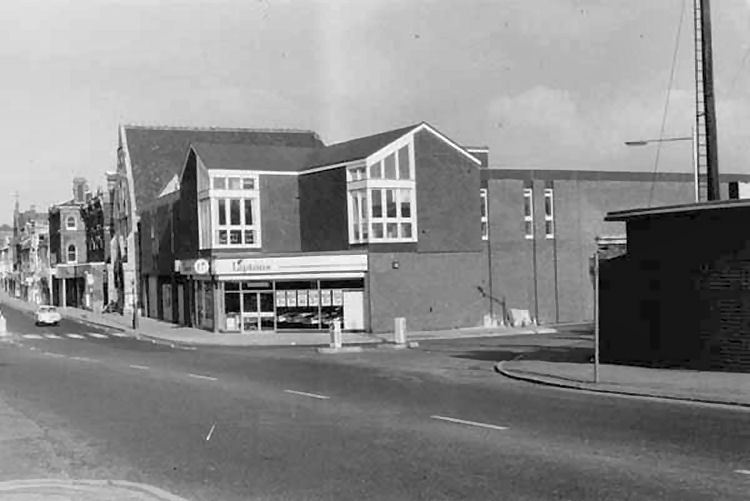
Above photo, 24 February, 1974. The new Lipton's shop opened on 30
September 1973.
Kindly supplied by
http://www.tonbridgehistory.org.uk/ |
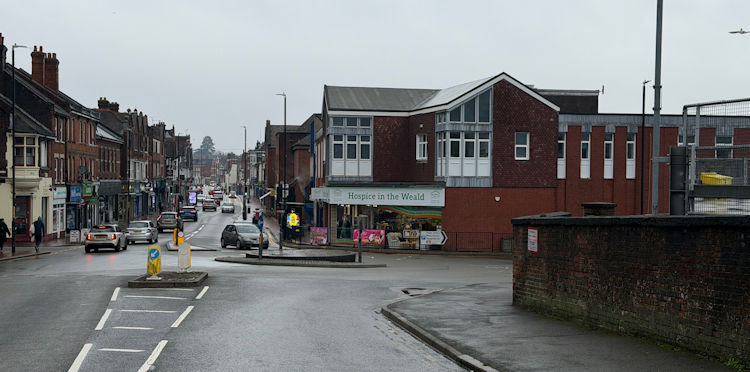
Above photo, 2026, kindly sent by Dan Griffiths. |
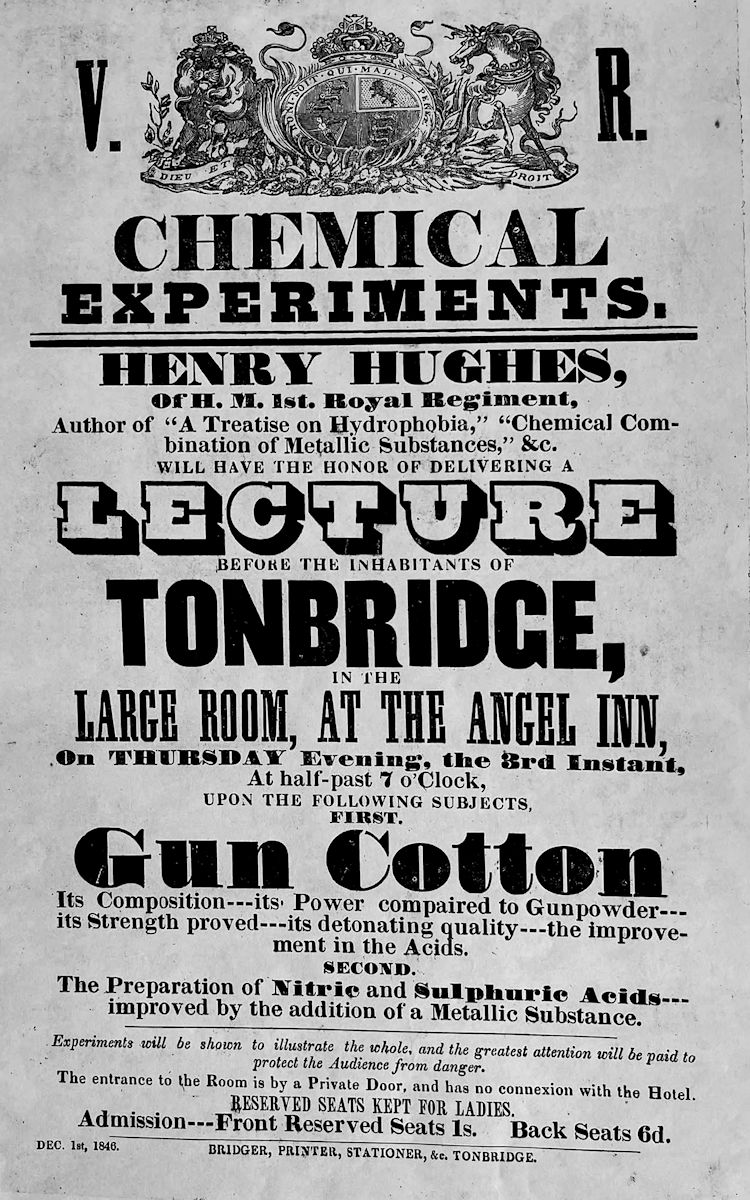
Above advert 1846. |
A celebrated inn was the "Angel Hotel" near the railway station at
Tonbridge, which started life as the "Angelus," the name change coming after
the Reformation (1517). It stood on the site of an ancient priory, but was
swept away for redevelopment of the site some years ago. The name of the pub
is remembered in Tonbridge Football Club's Angel Ground a short distance
away.
The Tonbridge Volunteers started in 1859. In 1860 they had their armoury
in the "Rose and
Crown" yard, from which they removed in 1870 to the "Angel," and in 1884
to their present headquarters. Military history in Tonbridge culminated in
the fact that at the present time three separate corps flourish,
representing respectively the counties of Kent, Middlesex, and Sussex.
|
From Ipswich Journal (Ipswich, England), Saturday, January 28, 1837; Issue 5158.
EXTRAORDINARY AND DISTRESSING OCCURRENCE.
On Thursday evening, the 12th inst., at about six o'clock, when the
Cranbrook coach, in which were two gentlemen and a female, arrived at
the "Angel Inn," Tonbridge, the door was opened by one of the outside
passengers, a brother of the female, for the purpose of offering her
some refreshment, she was observed to drop to one side, and to his
horror was found to be a corpse!
Assistance was instantly procured, and
on the body being conveyed into the house it was discovered that the
poor creature had been delivered of an infant, the dead body of which
was found at the bottom of the coach. It is very extraordinary that the
two gentlemen, the unfortunate creature's companions, were quite
ignorant of the circumstances. They stated that she did not at any
period of the journey from town evince any symptoms of indisposition. At
Riverhead, about nine miles distance, she called for a glass of water,
which was given her, and nothing particular was observed until the coach
reached Tonbridge. The relatives of the deceased are in a humble sphere
of life, and reside at Goudhurst. She was a single woman, who had been
living at service in London. In her pocket was found a box of pills, and
she had a small bottle of gin and water when she first got into the
coach, part of which she drank and also offered some to one of the
gentlemen. An inquest was held on the body by J. N. Dudlow, Esq.,
Coroner, and a verdict of "Died by the visitation of God " returned. - (
Taken from the Greenwich Gazette.) |
|
From the Kentish Gazette, 31 January 1837.
Distressing Occurrence.
On Thursday evening, the 12th instant, when the Cranbrook coach, in
which were two gentlemen and a female, arrived at the "Angel,"
Tonbridge, the door was opened by one of the outside passengers, a
brother of the female, to offer her refreshment; she was observed to
drop on one side, and was a corpse! Assistance was procured, and on the
body being conveyed into the house it was discovered that the poor
creature had been delivered of an infant, the dead body of which was
found at the bottom of the coach, it is extraordinary the two gentlemen
inside were ignorant of the circumstance. They stated that she did not
at any period of the journey from town evince symptoms of indisposition.
At Riverhead, about nine miles distance, she called for a glass of
water, which was given her, and nothing particular was observed until
the coach reached Tonbridge. The relatives of the deceased are in a
humble sphere of life, and reside at Goudhurst. She was a single woman,
and had been living at service in London. In her pocket was found a box
of pills, and she had a small bottle of gin and water when she first got
into the coach, part of which she drank, and also offered some to one of
the gentlemen.
An inquest was held on the body by J. N. Dudlow, Esq.
coroner, and a verdict of "Died by the visitation of God" returned.
|
|
Taken from
http://www.tonbridgehistory.org.uk
1842: A CRIMINAL CAUGHT
The Victorians had a ghoulish fascination with what one of them
called a ‘stunning good murder'.
One of the most notorious examples was the celebrated Roehampton case
of 1842, part of whose drama took place in Tonbridge. The story began
with the theft of a pair of trousers in Wandsworth, reached a climax
with a murderer's apprehension on a Tonbridge building site, and ended
with his death on the gallows at Newgate. The ineptitude of the
Metropolitan Police in pursuing the case led directly to the
establishment of a specialist Detective Department with its headquarters
at Scotland Yard.
Every detail of the ‘most frightful and appalling crime' at
Roehampton was described in The Times newspaper, whose lengthy reports
form the basis for this account.
A GRUESOME DISCOVERY
On 7th April 1842, a man identified as Mr Daniel Good was spotted
making off with a pair of trousers, snatched from the counter of a
Pawnbrokers' shop in Wandsworth High Street. A police constable was
called and went, with others, to a substantial house in nearby
Roehampton, where Good was known to be employed as coachman. A search of
the stables there was begun, in the presence of Good himself and some
other men. This revealed, beneath some hay, not the missing trousers,
but a limbless, headless female human torso. At the moment of this
discovery, Good ran out of the stable door and locked it behind him,
leaving the hapless policeman and his companions trapped inside. By the
time they managed to break out and raise the alarm, Daniel Good had
fled.
A description of Good was circulated – Irish, age about 46, sallow
complexion, bald patch – and a manhunt ensued, but after a few alleged
sightings the trail went cold. Meanwhile, remarkably, the grisly
remains, now identified as those of a woman with whom Good had been
living, were on public display in the stable where they had been found.
According to The Times, ‘Vehicles of every description, from the
aristocratic carriage to the costermonger's cart, were seen wending
their way towards the scene of the awful tragedy'. Among the many who
‘glutted their curiosity' at the scene ‘were, we regret to state,
numerous females, some of whom, we doubt not, would aspire to be
considered respectable women'.
A MURDERER AT LARGE IN TOWN.
The "Bull" public house where
Good spent his first night in Tonbridge. Peacocks shop now occupies the
site. (2014)
A week later the focus of attention switched to Tonbridge. Two days
after the murder, it transpired, Good had come down from London on a
fish-van (on its way empty back to the coast to collect another load for
the London fish market) and spent a night at the "Bull"
public-house in the High Street. He gave his name there as James Connor.
Next day he moved to lodgings at the nearby basket-makers, where the
landlady, Mrs Audrey, later reported him to be prone to pace about the
house, extremely anxious whenever anyone came to the door, and ‘much
disturbed at night'.
There was no shortage of construction work in Tonbridge at this time,
since the railway was due to open the following month, and cottages for
railway employees were being erected near the station. ‘Connor' was soon
taken on as a brick-layer.
What happened next was, from the murderer's point of view, pure
mischance. It turned out that one of the men working as a builder near
the station had previously served as a policeman in Wandsworth, and had
come across Daniel Good there. After a while this man realised that
Connor was actually the wanted murderer and alerted the superintendent
of the South Eastern Railway police in Tonbridge, Mr Humphrey.
The "Angel Inn," on the corner of Vale Road and the High Street, to
which the murderer was lured prior to his arrest.
As soon as he saw Humphrey, who was in uniform, Connor began to act
suspiciously. Nevertheless when the superintendent complimented him on
his hard work and invited him over to the "Angel Inn" for a pint of ale,
Connor replied 'Thankee, Sir, I will'. Seated by the fire in the Inn,
Connor removed his cap, revealing the bald patch beneath. Humphrey saw
that the man's description exactly matched what he had read in the
Police Gazette, and the wanted man was formally taken into custody. He
later appeared before the local Magistrate, Mr Hare, at the office of
his clerk, Mr Scoones, in East Street, before being despatched in
handcuffs to Maidstone gaol.
News of the arrest spread fast. As soon as it reached London, The
Times sent a reporter down to Tonbridge. He found ‘persons of all
classes flocking in from Tunbridge Wells and the adjacent villages ...
To many the "Bull" public house,
the residence of Mrs Audrey, and the erections at which the prisoner
worked, were objects of no small attraction'.
JUSTICE IS DONE.
The trial of the ‘inhuman monster, Daniel Good' in London on 13th May
1842 lasted just one day, and the jury only took half an hour to find
him guilty. The judge then donned the black cap and sentenced him to be
‘hung by the neck until you are dead'. The execution took place a week
later in front of Newgate prison, where the murderer met his end
‘assailed with the most hideous yells and long-continued execrations by
the mob'. Whether any of them were Tonbridge people is not known. |
|
From the Kentish Gazette, 20 May 1845.
On Whit Monday the annual meeting and dinner of the Tonbridge Town
Friendly Benefit Society, held at the "Angel Inn," in that town, took
place in a large marquee erected for the purpose in the grounds attached
to the house. About 350 persons, headed by a band of music, attended
divine service in the parish church.
|
|
Dover Chronicles 24 January 1846.
Fatal Accident on the South Eastern Railway.
We regret to state that a fatal accident, by which one individual
lost his life and another was much injured, occurred on Monday
night, or rather between 12 and 1 o'clock on Tuesday morning. On the
arrival of the luggage train from Dover, at the bridge which crosses
a river about a mile from Tonbridge, one of the abutments, owen it
is supposed, to the overflowing of the water and high winds which
prevailed at the time, gave way, and as soon as the engine entered
upon the bridge, one of the arches fell in, and the engine, tender,
and two of the luggage waggons, together with the engine driver and
stoker (brothers), of the name of Doyle, were precipitated into the
water. There were several other luggage carriages attached to the
train, but they were not injured. The deceased was a young man about
27 years of age, and bore a most respectable character. At the time
the accident happened the train was proceeding at a moderate rate.
The stoker is severely hurt but not considered dangerously. The
French mail, which ought to have been at the the terminus at London
Bridge on Tuesday morning at 5 o'clock, in consequence of the
accident did not arrive until 11 o'clock. The downward trains left
London the same morning at the usual time, planks having been placed
across the bridge on which passengers and goods could be safely
conveyed over the river, where another train was in waiting to
receive them. Up to the time the latest intelligence was received
the engine, tender, and two luggage waggons remained in the water,
and therefore the extent of the injury and loss of property cannot
at present the ascertained.
We hear that when the two unfortunate men were thrown into the
water, one of the brothers, by his intrepidity, rescued the other
from the watery grave; but he was so dreadfully injured and
exhausted, that he died on the bank of the river before he could be
removed to the station. The body of the deceased was dreadfully cut,
one of his thighs broken, and was otherwise injured. There were
fortunately no passengers, and the two brothers are the only persons
injured.
On Tuesday afternoon the bridge was so far repaired that the trains
were able to pass without interruptions.
The Inquest.
Tunbridge, Wednesday Night.
This afternoon, at 3 o'clock, Mr. Dudlow, one of the Coroner's for
the county of Kent, opened an investigation at the "Angel Inn," in
this town, before a highly respectable jury, relative to the death
of Charles Dolby, age 27, the unfortunate engine-driver who lost his
life by the deplorable accident.
Mr. P. W. Barlow, the engineer, Mr. Iberty, the superintendent of
the locomotive department, and other officials, attended to watch
the interests of the Company.
Charles Linnard a guard in his service of the South Eastern Railway
Company was then called. He said the deceased was an engine drivee,
in the employee of the Company. On Monday night, at 8 o'clock, he
left Dover with the luggage train, the deceased driving the engine,
which was a new one, numbers 120.There were seven waggons in the
train, laden with goods. It arrived safe at Tunbridge at about half
past 12 o'clock; and after waiting there a short time, and having
the usual signals, the train preceded. They had scarcely, however,
gone more than a mile from Tunbridge, before the accident took
place. He was sitting on the foot carriage, and felt a severe shock
the train being brought to a sudden stop. He immediately got down
and found that the bridge have given way. Saw the engine, tender,
and carriages in the water. The train was not going fast - not more
than 8 mph. He instantly put down a flag signal, and took a red
signal lamp down the line towards Tunbridge, in order to stop all
trains from that station. He also sent a man to the station, for
that purpose. On returning to the spot where the accident happened,
notice the deceased lying on his back alive. All he heard him say
was, "Lay me on my belly; oh, my thigh!" The deceased brother, who
was stoker, was near him, holding him out of the water. Witnessed
asked the fireman how it occurred, who replied that he did not know,
but felt the engine sink like into a hole and then turnover. Did not
say if the engine had gone over the bridge.
By the Coroner:- Believed the engine to be heavier than the tender.
After reviving the deceased from the bank, and having got him up on
the line, witness placed him in the last carriage of the train; and
having prepared a pilot engine, conveyed him on to Tunbridge, where
he expired in the course of 20 minutes. Could form no opinion as to
the cause of the accident. It took place about 1 o'clock on Tuesday
morning. Did not know what additional evidence the brother of a
deceased could give. Understood him to have dragged the deceased out
of the engine, and swam ashore with him.
The Coroner here asked the condition of the stoker, the deceased
brother, who was lying at the house, with a view of learning whether
he was in a fit state to be examined.
Mr. Goram, a surgeon, who had charge of him, replied that he did not
think him sufficiently recovered to undergo the excitement which as
examinations night produce. There was a deep wound across his scalp;
and from the state he was in any conversation might possibly be
dangerous to his recovery.
The Coroner then wished to know if the jury deemed it necessary to
have the stoker's evidence. Was anyone present who heard him mention
anything relating to the accident?
A Juryman remarked that the stoker, being a member of a benefit
society in which he belonged, he waited upon him on the subject of
the accident, when he observed that he could not tell how it took
place. They were going at a slow and steady rate, when they felt the
engine falling, and were pitched in to the river.
The Coroner inquired to the Juryman if he heard the stoker describe
the engine to have gone over the bridge?
The Juryman answered that he did not.
Another Jurer observed that he had been told by the stoker that it
was very likely that the engine would have safely gone over the
bridge had it not been for the carriages behind. He was informed by
him that the tender sunk with the bridge, pulling back the engine,
and dragging the carriages after it.
In consequence, therefore, of the dangerous states of the brother of
a deceased, it was determined for the present, not to examine him.
The Coroner then put it to the Jury if they were desirous of a
adjourning the investigations, in order to gain the opinions of the
Company's engineer. The Jury wished the court to be cleared, so as
to consult together on the subject, and eventually agreed to and an
adjournment.
|
|
From the Kentish Gazette, 27 January 1846.
FATAL ACCIDENT ON THE SOUTH-EASTERN RAILWAY.
We regret to state that a fatal accident, by which one man lost his life
and another was much injured, occurred in Monday night, or rather
between twelve and one o’clock on Tuesday morning. On the arrival of the
luggage train from Dover at the bridge which crosses the river about a
mile from Tonbridge, one of the abutments, owing it is supposed to the
overflowing of the water and high wind which prevailed at the time, gave
way, and as soon as the engine entered upon the bridge, one of the
arches fell in, and the engine, tender, and two of the luggage wagons,
together with the engine driver and stoker (brothers) of the name of
Dobie, were precipitated into the water. There were several other
luggage carriages attached to the train, but they were not injured. The
deceased was a young man about 27 years of age, and bore a most
respectable character. At the time the accident happened the train was
proceeding at a moderate rate. The stoker is severely hurt, but not
considered dangerously. The French mail, which ought to have been at the
terminus at London Bridge on Tuesday morning at five o’clock, in
consequence of the accident did not arrive until eleven o’clock. The
downward trains left London on Tuesday morning at the usual time, planks
having been placed across the bridge on which passengers and goods could
be safely conveyed across the river, where another train was in waiting
to receive them. The engine, tender, and two luggage wagons remained in
the water.
On Tuesday afternoon the bridge was so far repaired that the trains were
able to pass without interruption.
The accident took place on that part of the railway traversing the
Medway Valley, within 1 1/2 mile from Tonbridge, and 39 1/2 distant
from London. The line at this point is carried along an embankment,
varying from 18 to 20 feet high, far a distance of nearly three miles,
terminating with the entrance of the Tonbridge station. The Medway,
passing under the railway at Eden Bridge, 10 miles from Tonbridge, runs
on the North or down side of the line as far as Penshurst, where an
elbow or branch again parses under the road, and irrigates the meadows
on the South side, until within a short distance of the spot where the
accident occurred, where the elbow again runs to the North, and shortly
after joins the parent stream. The embankment, is supplied throughout
its entire length with a number of bridges, technically known as
“occupation bridges,” which afforded the necessary means of
communication between the farms on either side of the railway. The
failure of one of those bridges was the immediate cause of the accident.
It is unnecessary to inform those familiar with the district or country
known as the Medway Valley, that at certain periods of the year, the
winter season especially, when the river is much swollen, immense tracts
of arable and pasture land are frequently laid under water for weeks
together. The heavy rains which fell on Sunday and Monday last increased
the level of the river in an extraordinary degree, and the flood which
followed on the evening of the latter day may be fairly stated to have
been the proximate cause of the accident.
THE INQUEST.
On Wednesday, an Inquest was held on the body of the engine-driver,
whose name was James Dobie, at the "Angel Hotel," adjoining the
Tonbridge Railway station. Alter the Jury had been sworn, they proceeded
with the Coroner, Mr. Barlow, the resident engineer, and other officials
of the Company, in a special train to the spot where the accident
occurred, and having made a minute examination so far as the then state
of the floods would allow, they returned to the Inquest-room, and then
viewed the remains of deceased, which were lying at the Railway
terminus.
Several witnesses were examined, but their evidence was merely
corroborative of the state of the road as stated above.
Mr. J. P. Barlow in reply to questions addressed to him by the Coroner,
said, that until the water which at present flooded the land near the
spot where the accident occurred had subsided, he did not feel prepared
to give a decided opinion as to the cause of the accident. He had come
to a very decided opinion in his own mind, and that was, that the
accident had occurred from the meeting of two currents of water near the
occupation bridge; but, until he had had an opportunity of making a more
minute examination than was possible at present, he should prefer
avoiding to go into detail on the subject.
The inquiry was adjourned till Monday next.
The wreck caused by the accident still remains in its original state,
and it will be some time before anything can be done to remove it. The
engine is still lying in a hole about 20 feet below the surface of the
railway, and the tender is altogether out of sight. Gangs of men have
been at work night and day since the accident; and the down line, which
was comparatively little injured, is sufficiently repaired to enable
trains to pass over it. The sandy nature of the soil has occasioned
considerable difficulty in repairing the mischief, and no doubt the
original catastrophe may be in some degree traced to the same cause.
|
|
Dover Chronicles 31 January 1846.
The Late Accident on the South Eastern Railway.
Adjourned Coroner's Inquest.
At 3 o'clock on Monday afternoon, the adjourned coroner's inquest
concerning the death of James Dobell, the unfortunate engine-driver
who lost his life by the recent accident on the South Eastern
Railway, was resumed before Mr. Dudlow, and the jury previously
empanelled, at the "Angel Inn," Tunbridge.
The four inquiry, it will be recollected, was adjourned for the
purpose of affording the Company's engineers an opportunity of
examining the exact state of the foundation of the bridge that
caused the catastrophe - the flood of water preventing the necessary
inspection. Instead of the water subsiding, however, the heavy rains
of last week have inundated acres of land along the side of the line
to the depth of several feet.
After other evidence, Mr. H. P. Barlow, the resident engineer of the
South Eastern Railway, was then sworn. He attributed the accident to
the unfortunate circumstance of the flood carrying away the bank of
the north pit, through the occupation bridge, into the deeper or
south pit. The bridge was perfectly substantial, and could have with
withstood any flood had it not been for the deep ballast hole on the
south side of it; the fact of the northern side of the structure
with standing the rush of water and still remaining secure, was a
satisfactory proof of its solidity. It was a difference of level of
water that led to the deplorable occurrence. He did not think that
if the train had been a passenger one, that the bridge would have
given way; for it was evident that the engine and tender had almost
passed over it, and it was the weight of a goods train that forced
it in.
The Coroner said he understood that Major General Pasley had visited
the bridge since the occurrence, and probably Mr. Barlow could
inform the Jury of that gentleman's opinion as to the cause of the
event.
Mr. Barlow replied that he had no authority to give the gallant
Generals opinion; but from what he had heard from that officer, he
believed he "General Pasley) entertained a similar opinion as he did
on the subject.
The Jury, after hearing some further evidence, came to the following
verdict:- We find that James Doble was killed in consequence of the
falling of a bridge called Johnson's bridge, in this parish, by
means of the foundation of the bridge being undermined and washed
away by an unexpected flood of water; and in the opinion of the
Jury, it is a dangerous practise to make drains under arches, as it
tends to weaken the foundation; and the Jury consider the ballast
hole, alluded to in the evidence adduced, is too near the line of
railway."
]The verdict was accompanied by a nominal deodand of 1s. on the
engine and tender.
|
|
From the Kentish Gazette, 3 February 1846.
THE LATE FATAL ACCIDENT BY THE FALLING OF A BRIDGE ON THE SOUTH EASTERN RAILWAY.
ADJOURNED CORONER’S INQUEST.
Tonbridge, Monday Night.— At three o’clock this afternoon the adjourned
coroner’s inquest concerning the death of James Dobie, the unfortunate
engine driver who lost his life by the recent accident on the
South-Eastern Railway, was resumed before Mr. Dudlow, and the jury
previously empanelled, at the "Angel Inn."
The former inquiry, it will be recollected, was adjourned for the
purpose of affording the Company’s engineers an opportunity of examining
the exact state of the foundation of the bridge that caused the
catastrophe—the flood of water preventing the necessary inspection.
Instead of the water subsiding, however, the heavy rains of last week
have inundated acres of land along the sides of the line to the depth of
several feet.
After other evidence, Mr. H. P. Barlow, the resident engineer of the
South-Eastern Railway, was then sworn. He attributed the accident to the
unfortunate circumstance of the flood carrying away the bank of the
north pit, through the occupation bridge into the deeper or south pit.
The bridge was perfectly substantial, and could have withstood any flood
had it not been for the deep ballast-hole on the south side of it; the
fact of the northern side of the structure withstanding the rush of
waters and still remaining secure was a satisfactory proof of its
solidity. It was the difference of level of water that led to the
deplorable occurrence. He did not think that if the train had been a
passenger one that the bridge would have given way, for it was evident
that the engine and tender had almost passed over it, and it was the
weight of a goods train that forced it in.
The Coroner said he understood that Major-General Pasley had visited the
bridge since the occurrence, and probably Mr. Barlow could inform the
jury of that gentleman’s opinion as to the cause of the event.
Mr. Barlow replied that he had no authority to give the gallant
general’s opinion; but from what he had heard fall from that officer he
believed he (General Pasley) entertained a similar opinion as he did on
the subject.
The jury, after hearing some further evidence, came to the following
verdict:— "We find that James Dobie was killed in consequence of the
falling of a bridge called Johnson’s Bridge, in this parish, by reason
of the foundation of the said bridge being undermined and washed away by
an unexpected flood of water; and in the opinion of the jury, it is a
dangerous practice to make drains under arches, as it tends to weaken
the foundation and the jury consider the ballast-hole, alluded to in the
evidence adduced, is too near the line of railway.”
The verdict was accompanied by a nominal deodand of 1s. on the engine
and tender.
(It was in this year that deodand's were finally abolished by
Parliament. Paul Skelton.)
|
|
From the Kentish Gazette, 19 May 1846.
Fatal Railway Accident.
On Tuesday an inquest was held at the "Angel Tavern," Tonbridge, on the
body of a man named John Shorn, who was killed on the South Eastern
Railway. It appears that he lived at the village of Leigh, which is
situate close to the line, and on Saturday night had been drinking with
some companion at a beershop at Tonbridge, which he left at half past
eleven o’clock to go home. A pilot engine had been assisting the mail
train, which was rather heavy, from town and left it at Tonbridge. On
proceeding along the up line over a viaduct, about a mile and a half
from the town, the driver felt the engine pass over something on the
rails. He stopped as soon as possible, and on walking back to the spot
he found the deceased lying across the right-hand rail quite dead, being
nearly cut in two. The impression was that he was lying across the rail
when the accident occurred. If he had been walking at the time the
engine-driver would have seen him, as it was a bright moon-light night.
There was no pathway across the line where the body was found. The jury
returned a verdict of Accidental Death, with a deodand of 1s. on the
engine.
|
|
South Eastern Gazette, 3 May 1853.
Tonbridge. Coroner's Inquest.
An inquest was held at the "Angel Inn," on Tuesday last, before J. N.
Dudlow, Esq., on the body of Mrs. Marey Skinner, wife of Mr. Andrew
Skinner, farmer, of Tonbridge, who was found drowned in a pond near
their residence on Monday, the 25th instant.
Emma Lusted deposed that she lived as servant to Mr. Skinner. The
deceased was the wife of Andrew Skinner of Mailedon Farm. She was 61
years of age. Saw the deceased alive a little after 10 o'clock on Monday
morning. She was in the wash house, and said she must go to the water
closet. She was gone some time, and then witness went and told her
sister. They went out and saw the trails of patterns towards the pond,
and pulled deceased out. When witness got there deceased was on the edge
of the pond, and was quite dead. She had her bonnet on but no shawl. Mr.
Skinner was off for the surgeon. When witness went there three weeks ago
deceased appeared very much better, but on the following day she said
she could not sleep. She was worse afterwards; on Sunday she was very
bad, also on Monday morning. She was very restless and odd in her manner
at times. Last Christmas she was very low and desponding. Never heard
her threaten to destroy herself. A lady had told her (witness) that
deceased's sister was very much in the same way.
Mr. James Parker, surgeon, deposed that Mr. Skinner came for him on
Monday morning. His assistant went before him and he followed
immediately. Found deceased in the house quite dead. Had attended her
for several years; had noticed the change in her for five or six years,
more so lately. She had expressed a fear that she should not refrain
from destroying herself; but she hoped she might be prevented. She was
generally worse in spring and autumn.
Verdict:- "Deceased destroyed herself, not having at the time of same
mind."
The same jury then proceeded to the house of Mr. Benjamin Baker, Brewer,
of Tonbridge, to view the body of a new-born female child, when the
following evidence was given:-
Martha Russell, widow, deposed at about six o'clock that morning Mrs.
Baker sent for her. When she got there she told her that Mary Owen, her
servant, had got a baby. Whet upstairs and saw the child lying on the
floor in her petticoat; it was dead. It appeared a full grown child.
Owen told witness it was not born alive, it did not move nor cry. She
said she thought it was about 3 o'clock, that she did not know she was
in the family way; that she had called out about 12 o'clock and again at
three, but no one came to her.
Mr. J. Goreham, surgeon, deposed that he was sent for at half-past six
in the morning. Saw the deceased child as described by last witness.
Mary Owen was on the bed, and had just been delivered. The child had its
arms and legs curled up. There was no marks of deformity or violence.
The girl said the child did not cry nor move. From external examination,
he could not form a decided opinion whether the child was born alive or
not. On a post mortem examination he concluded that breathing had been
performed in perfectly. Did not think the child was born alive.
Verdict, "That the child was still born."
|
|
Kentish Gazette, Tuesday 25 January 1859.
TUNBRIDGE. Shocking Accident with a Team.
On Wednesday forenoon a deplorable accident occurred to a labouring
man named Isaac Hazleden, in the employ of Mr. Couchman, Nizel's
Hoath.
The man had charge of a team, and was going in the direction of
Tunbridge Wells for some tiles. When near the "Angel Inn" the horses
took fright, and he seized the reins of one of the horses to stop
it. He was thus dragged across the railway bridge, and received some
fearful injuries. His scalp was torn completely off on the left
side, leaving the skull entirely bare; he was also extensively
bruised. The poor man was conveyed home by Mr. Goddard, parish
constable, and Mr. Parker surgeon, dressed his wounds. If erysipelas
does not occur there is a chance of his recovery. By the last
accounts he is progressing as favourably as could be expected.
I don't think this could have been
referring to the "Angel"
in Tunbridge Wells, as by 1828 that was called the "Kentish
Hotel." Paul Skelton.
|
|
South Eastern Gazette, 24 July, 1860.
Violent Assault on a Policeman.
John Foster, William Foster, and Frederick Foster were charged
before Arthur Pott, Esq., and Major Scoones, at the magistrates’
clerk’s office, on Monday, with having committed a violent assault
on David Thirkell, 173 K.C.C., at Tunbridge, on the previous Sunday
afternoon, in the execution of his duty.
The complainant said that at about two o’clock he was called into
the "Loggerheads" public-house by the landlord, who said that there
were a number of men fighting in the tap-room, and wished him to get
them out. He went into the house, and the three prisoners were there
with several others. John Foster was stripped, and was sitting on
the knee of Frederick, who was acting as his second, and William was
backing him. Both himself and the landlord wished them to go away
quietly, but they refused. They, after much trouble, got them out of
the house, and about two hundred persons were assembled in the
street. John Foster then came up to him and struck him a blow on the
head. Upon this he took him into custody, and was struggling with
him, for nearly three-quarters of an hour to get him to the
police-station, but he could get no assistance. During that time he
was struck several times by the other prisoners, and also kicked by
them in their endeavours to get the prisoner John away from him, and
they succeeded in doing so three times. Having at last obtained
assistance, he succeeded in getting near the "Angel Inn," when
Superintendent Dance came up, and prisoners were apprehended. Mr.
Geo. Truckle, of the "Loggerheads," deposed to the violence of the
prisoners in his house, and Superintendent Dance said that when he
reached the constable he found him nearly exhausted. The prisoner
William showed fight, and put his hands in his face. The prisoners
had before assaulted the police, and as it was a bad case he wished
the prisoners sent for trial. Frederick had escaped, but was
apprehended on a warrant that morning.
The prisoner John Foster said that he was in the service of the
Marquis of Bristol, and after an absence of three years had only
come home for a two days’ holiday on the Sunday morning.
The prisoners were remanded, bail being refused.
|
|
South Eastern Gazette, 4 September, 1860.
INSOLVENT DEBTORS to be heard at the Sessions House, Maidstone,
before the Judge of the County Court of Kent, on Wednesday, the
Nineteenth day of September, 1860, at Eleven o’clock in the forenoon
precisely.
WILLIAM PARKER, formerly of the "Rose and Crown Hotel," Tonbridge,
Kent, in co-partnership with William Parker, senior, under the style
or firm of Parker and Son (during part of the time keeping the
"Angel Inn," Tonbridge), hotel keepers and wine merchants, during
part of the time carrying on the refreshment rooms at Tonbridge and
Ashford stations on my own account; then of same places, in
co-partnership with William Parker, senior, and William Parker, under
the style or firm of Parker, Son, and Parker, so far as regards the
"Angel Inn;" then of the "Angel Inn," Tonbridge, Kent, in
co-partnership with Sarah Parker, under the style or firm of William
and Sarah Parker, licensed victuallers and wine merchants; then of
the "Rose and Crown Hotel" and of the "Angel Inn," Tonbridge, Kent,
in co-partnership with Sarah Parker as aforesaid, hotel keepers and
wine merchants; then and late of Tonbridge, Kent, assistant to Mrs.
Sarah Parker, of the "Rose and Crown Hotel" and "Angel Inn,"
Tonbridge, Kent.
CHARLES MORGAN,
Insolvents' Attorney, Maidstone.
|
|
South Eastern Gazette, 23 October, 1860.
Maidstone Insolvent Court.
This court was held on Wednesday last, before J. ’Espinasse, Esq,.
Judge.
William Parker, late of the "Rose and Crown Hotel" and "Angel Inn,"
Tunbridge, came up for adjourned hearing, supported by Mr. Dowse,
barrister. Mr. Bowell, solicitor again appeared to oppose, but after
some explanations from Mr. S. Alleyne, solicitor, he withdrew his
oppositions and the insolvent received his discharge.
|
|
South Eastern Gazette, 27 November, 1860.
SPECIAL Session, Friday. (Before A. Pott, Esq., chairman, and Major
Scoones).
Jane Draper, a tramp, was charged with stealing a purse, containing
9s., the property of Henry Palmer, a labourer. The prosecutor went
with the prisoner, on the 14th Inst., to Helmsley’s beer-house,
("Railway
Arms") and
after that to the "Angel," where he found that his purse was gone.
As he had been with no one but the prisoner, he accused her of
having it, and said that he would give her in charge unless it was
returned. The prisoner was apprehended by Supt. Dance, but no money
was found upon her.
Committed for trial.
|
|
Kent Times, 12 April 1862.
A Noisy Bacchanalian.
Stephen Annett, Tunbridge, was charged by Supt. Dance, with being
drunk and riotous on the 29th ult. at Tonbridge.
P.C. Morris said that while on duty near the "Angel Inn," Tonbridge,
between 12 and 1 o’clock on the night in question the defendant came
down the street hallooing and dancing. He told him to go quietly.
Defendant became then very abusive and used vile language. He
afterwards, went along with another person, conducted himself in the
same manner crossing the Railway bridge.
Defendant stated that he came out of the "Chequers Inn" about
half-past 11 o’clock. He remembered all that passed distinctly, and
had a witness to prove that the evidence was false but he would not
come.
Supt Dance informed the Bench that the defendant invariably made a
noise when he caught sight of a constable.
Fined 5s. and 10s costs, in default seven days.
|
|
From the Southeastern Gazette, 23 January 1866.
Death of a Child by Fire. An inquiry was held yesterday (Monday) week, at the
“Angel Inn,” before J. N. Dudlow, Esq., coroner, relative to the death
of George Barden, four years of age. The deceased’s parents left the
little fellow in the care of an elder sister, on the previous Friday
afternoon, and whilst she went down into the basement to draw some
water, it is supposed the child’s clothes caught fire. Another little
brother, six years old, gave an alarm, and Mrs. Swan, who lets part of
the house to Mr. Barden, ran upstairs, and with the assistance of a man
named Vards, who happened to be near, succeeded in extinguishing the
flames, not however until the lower part of the poor child’s body and
legs were so severely burnt that it died next morning. Mr. Bishop in the meantime attended. Verdict “Accidental death,” the jury recommending
at the same time that a fire screen should be used. They also wished it
to be generally known that an ounce of alum dissolved in a gallon of
water made a solution which would prevent clothes that had been
prepared with the mixture from catching fire. A subscription was made
by the jury for the parents of the child. |
|
From the Southeastern Gazette, 24 April 1866.
On Friday an inquest was held at the “Angel Inn,” before J. N. Dudlow,
Esq., coroner, on the body of Albert John Jeffrey, aged between three
and four years. It appeared that on the 26th March the poor little
fellow was left alone in the kitchen whilst his mother went to a
baker’s, shop, a few doors off. During her absence the child’s clothes’
caught alight and his screams brought a neighbour to his assistance. Mr.
Smith, assistant to Mr. Bishop, surgeon, was called in, but the injuries
received were so severe that the little one did on Tuesday last.
Verdict “Accidental death.”
|
|
From the Southeastern Gazette, 5 June 1866
Petty Sessions, Tuesday. (Before E. Cooper, Esq., in The chair, Major
Scoones, and H. X. Moore, C. Powell, and R. Rodger, Esqrs.)
The license of the “Rose and Crown Hotel,” and the “Angel Inn,” both of the
same place, from the late Mrs. Sarah Parker, to her executor Mr Chantler
of Southborough.
|
|
From the Southeastern Gazette, 26 June 1866.
TO HOTEL KEEPERS, CAPITALISTS, &c.
TO BE DISPOSED OF BY PRIVATE CONTRACT,
AN old-established and first-class BUSINESS of an Hotel Keeper, carried
on at the “ROSE and CROWN HOTEL,” TONBRIDGE, for upwards of 50 years,
Also the Freehold of the Hotel, comprising a large and commodious house,
with newly-erected billiard and dining rooms, suitable coach-houses,
stabling, and other necessary conveniences, together with the Tap,
occupied by a respectable tenant.
Also the old and respectable BUSINESS of an Hotel and Innkeeper carried
on at the “ANGEL INN,” TONBRIDGE.
Also the Lease of the said Inn (of which 18 years from Christmas last
are unexpired), with coach-houses, stabling, and extensive yard,
advantageously situate near the South Eastern Railway Station.
The furniture, stock in trade, fixtures, and other effects of both the
above hotels to be taken at a valuation in the usual way.
For particulars and to treat for the purchase apply to Mr. Thomas
Langridge, of Mereworth; Mr. John Chantler, of Southborough; or to
Messrs. Alleyne and Walker, Solicitors, Tonbridge.
|
|
From the Southeastern Gazette, 26 June 1866.
Mrs. SARAH PARKER, Deceased.
ALL persons having any claims or demands on the estate of the late Mrs.
SARAH PARKER, of the “Rose and Crown Hotel” and “Angel Inn,” Tonbridge,
Kent, deceased, are requested to send the particulars thereof to Mr.
Thomas Langridge, of Mereworth, or to Mr. John Chantler, of Southborough
(two of the executors); and all persons indebted to the said estate are
requested to pay the amount of their respective debts to the said Thomas
Langridge or to the said John Chantler.
ALLEYNE & WALKER,
Solicitors to the Executors.
Tonbridge, 22nd June, 1866.
|
|
Kentish Gazette, 8 February, 1870.
TUNBRIDGE.
Duping An Uncle.
At the Police Court, on Saturday, a young man, named Henry P.
Allnutt, a clerk, of Reading, was charged with obtaining £3 4s. by
false pretences from the Rev. R. L. Allnutt, representing to him
that he was his nephew, and asking for the amount named to pay for a
machine which was lying at the “Angel Inn.” The money was advanced
to him, but on enquiries being made, it was found that the statement
regarding the machine was entirely false. Information was at once
given to the police, who, in company with the rev. gentleman,
proceeded to the railway station, from which a train was about to
start for London. Several passengers were taken from their seats
before the real culprit was identified, but when found he was taken
to the police station. Enquiries were made by telegraph, and it was
found that the young man really was the nephew of the rev.
gentleman, who, on discovering this, and a promise being made that
the money should be refunded, declined to prosecute, and the young
man was discharged.
|
|
From the Kent and Sussex Courier, 7 November, 1873.
The Tonbridge Bonfire Boys celebrated the Fifth this year in a manner
never before attempted. For some time past an energetic committee,
having head quarters at the "Angel Hotel," have been working with a will
in obtaining subscriptions, which came in very readily, and arranging
the preliminaries prior to the great carnival of the year. A magnificent
banner was purchased, and a pyrotechnist engaged to give a capital
display of fireworks. The 'boys' attired in costumes of every period
since the Flood, representing demons, pirates, courtiers, clowns, &c.,
&c., met at head-quarters, where they were marshalled into processional
order, the band taking the lead, followed by banner bearers. One banner
was inscribed "Inkerman," though what that had to do with Guy Fawkes we
cannot say. The procession started shortly after seven o’clock up the
High-street, followed by some thousands of people, who flocked in from
Tunbridge Wells, Sevenoaks, and the adjacent towns and villages. They
went round the upper part of the town, by Bourdyke, through Swan Lane,
into High-street again. Then, after a short halt at the "Angel," the
lower part of the town was traversed, and at ten minutes to nine
o’clock, the "boys" returned to the Angel Cricket Ground, where they
were at liberty to indulge in squibbing to their hearts’ content. In the
streets, the committee kept strict watch that no fireworks were
discharged, but a number of stragglers, notwithstanding the
good-humoured cautions of the police, persisted in throwing lighted
squibs and crackers about wherever they saw two or three members of the
female sex about. Otherwise the police, under Superintendent Dance, had
little trouble in maintaining order. One unruly 'boy,’ an elderly one,
who was particularly lively and mischievous, obtained his deserts when
on the Great Bridge, and narrowly escaped very serious injury. He had in
his pocket a number of squibs, which ignited in some manner, and were
only got rid of just in time. At the Cricket Ground, which the day
before was completely flooded, was a monster bonfire, made up of an
incalculable number of butter tubs, oil casks, hop-poles, bundles of
faggots, &c., which when ignited, after the fireworks, sent up a flame
to a very considerable height. For the benefit of those who liked to pay
for the privilege, there was a planked enclosure, the entrance to which
was through the Angel gardens, which were prettily lit up with small
glass lamps. In this enclosure was erected a stand, which shortly before
nine o'clock was well patronised. Suddenly the occupants became a mark
for the 'boys,' and squibs vicious and squibs mild were hurled at them,
the natural consequence of which was that but very few stuck to their
posts, especially when one or two ladies got their dresses, shawls, and
chignons burnt. The 'boys' and the spectators, notwithstanding the
unpleasant closeness of a squib now and then, enjoyed themselves, and
the Fifth of November in Tonbridge will long be pleasantly remembered.
|
|
From the Kent and Sussex Courier, 19 August 1874.
Licensing Business.
Mr Hallett, of the "Angel Hotel," Tonbridge, was sent for by the Bench
with reference to the athletic sports in the Angel field on Good Friday,
when she knew that a memorial had been signed against it by large number
of parishioners.
Mrs. Hallett said she thought there was no harm in it, as similar things
occurred at other places on that day, but she would take care that it
would not repeated.
|
|
From the Kent and Sussex Courier, Friday 29 September, 1893.
DRUNK.
Albert Goldsmith was summoned for being drunk at the "Angel Hotel,"
Tonbridge, on the 14th September.
I.C. Weller said that at 10 minutes past eleven he found the defendant
drunk in the front bar and using bad language. he refused to leave when
Miss Robertson requested him and witness had to forcibly eject him.
The defendant, who did not appear, was fined 5s. and 6s. costs, or seven
days' hard labour.
|
|
From an email received 22 October 2016.
Suicide at Angel Hotel, Tonbridge.
When I was a teenager back in the early 60’s I used to work at the Angel
Hotel Tonbridge at weekends, I got paid 10/0 shillings a week, one
weekend the Landlady (I think her name was Mrs Sykes) asked me to stay
behind and do some extra work for her, normally I used to clean the
bars, restock the shelves and take their Alsatian dog Doogle for a walk,
this day she asked me to clean several pairs of shoes after which she
gave me a further 10 shillings and said “that’s between you and me, no
one will ever know”, that night she committed suicide by gassing
herself. To this day I still wonder why, and why I was asked to clean
those shoes. I have tried to find records of her suicide on line without
any Joy.
Yours Sincerely,
John Piper.
|
LICENSEE LIST
TYRRELL Thomas 1828-34+
 
BATCHELOR William 1840+
PARKER William jun & Sarah 1855-60+ (also "Rose
& Crown")
PARKER Sarah 1862-June/66 dec'd
CHANTLER Mr June/1866+
HALLETT Sarah Elizabeth 1874-82+ (also Proprietoress of the Tonbridge
Cricket Ground, widow age 48 in 1881 ) )
ROBERTSON Jane A 1891-1901+ (widow age 47 in 1891 ) )
ROBERTSON A A Mr to Aug/1923 dec'd

ROBERTSON Kate Edith (widow) Aug/1923+

WITHEY Basil 1938+
BALCH W J 1949+
SKYES Mrs 1964+
https://pubwiki.co.uk/AngelHotel.shtml
http://www.closedpubs.co.uk/angelhotel.html
 From the Pigot's Directory 1828-29 From the Pigot's Directory 1828-29
 From the Pigot's Directory 1832-33-34 From the Pigot's Directory 1832-33-34
 Kent
and Sussex Courier Kent
and Sussex Courier
 Census Census
|
























